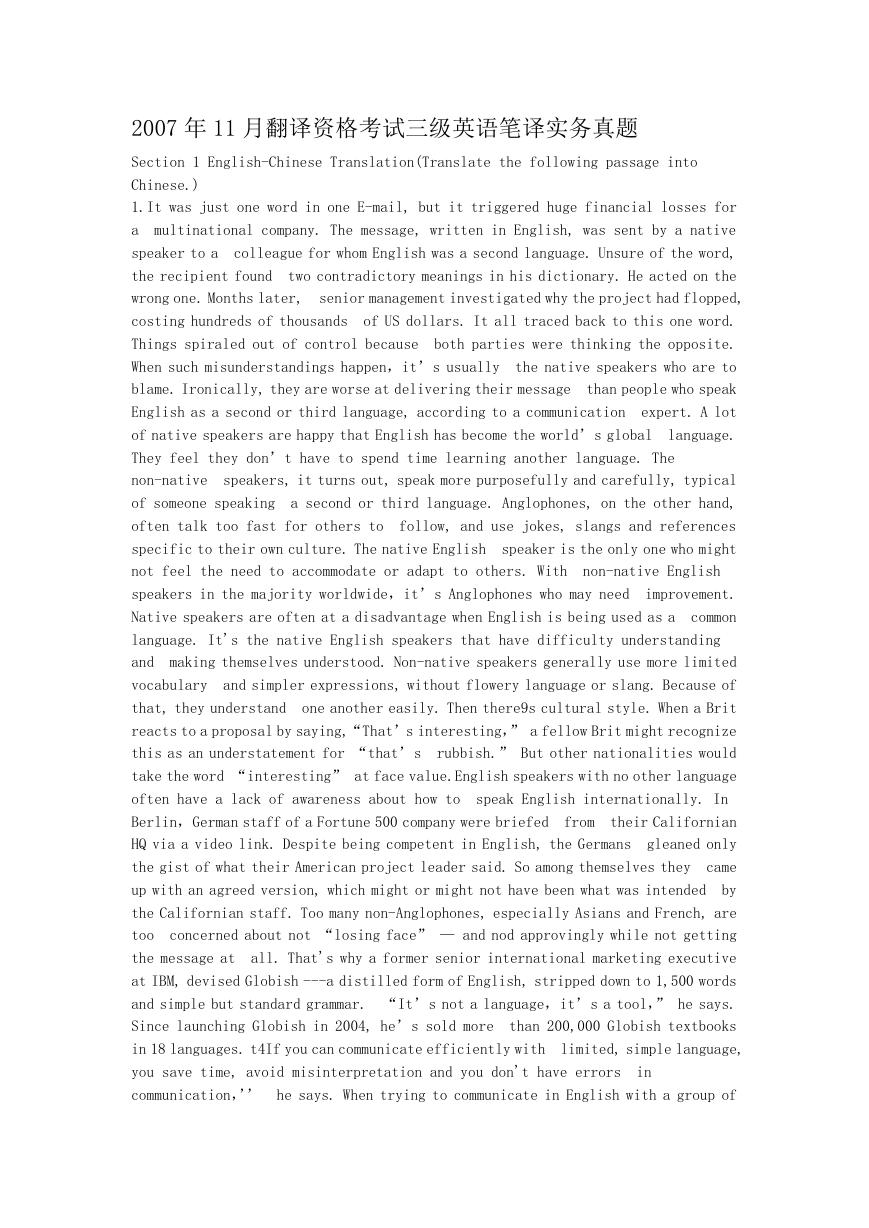2007 年 11 月翻译资格考试三级英语笔译实务真题
senior management investigated why the project had flopped,
speakers, it turns out, speak more purposefully and carefully, typical
a second or third language. Anglophones, on the other hand,
follow, and use jokes, slangs and references
speaker is the only one who might
Section 1 English-Chinese Translation(Translate the following passage into
Chinese.)
1.It was just one word in one E-mail, but it triggered huge financial losses for
multinational company. The message, written in English, was sent by a native
a
speaker to a
colleague for whom English was a second language. Unsure of the word,
the recipient found
two contradictory meanings in his dictionary. He acted on the
wrong one. Months later,
costing hundreds of thousands
of US dollars. It all traced back to this one word.
Things spiraled out of control because both parties were thinking the opposite.
When such misunderstandings happen,it’s usually
the native speakers who are to
blame. Ironically, they are worse at delivering their message than people who speak
English as a second or third language, according to a communication
expert. A lot
of native speakers are happy that English has become the world’s global
language.
They feel they don’t have to spend time learning another language. The
non-native
of someone speaking
often talk too fast for others to
specific to their own culture. The native English
not feel the need to accommodate or adapt to others. With
speakers in the majority worldwide,it’s Anglophones who may need
Native speakers are often at a disadvantage when English is being used as a
language. It's the native English speakers that have difficulty understanding
and
making themselves understood. Non-native speakers generally use more limited
vocabulary
and simpler expressions, without flowery language or slang. Because of
that, they understand
one another easily. Then there9s cultural style. When a Brit
reacts to a proposal by saying,“That’s interesting,” a fellow Brit might recognize
this as an understatement for “that’s
rubbish.” But other nationalities would
take the word “interesting” at face value.English speakers with no other language
often have a lack of awareness about how to
their Californian
Berlin,German staff of a Fortune 500 company were briefed from
gleaned only
HQ via a video link. Despite being competent in English, the Germans
the gist of what their American project leader said. So among themselves they
came
up with an agreed version, which might or might not have been what was intended by
the Californian staff. Too many non-Anglophones, especially Asians and French, are
concerned about not “losing face” — and nod approvingly while not getting
too
the message at
all. That's why a former senior international marketing executive
at IBM, devised Globish ---a distilled form of English, stripped down to 1,500 words
and simple but standard grammar. “It’s not a language,it’s a tool,” he says.
Since launching Globish in 2004, he’s sold more
than 200,000 Globish textbooks
in 18 languages. t4If you can communicate efficiently with limited, simple language,
you save time, avoid misinterpretation and you don't have errors
communication,’’ he says. When trying to communicate in English with a group of
in
non-native English
improvement.
common
speak English internationally. In
�
a normal pace. One
and asking
to language variation. In meetings,
with varying levels of fluency, it's important to be receptive and adaptable,
into a whole range of different ways of using English. People who’
are good at doing that,but native speakers of English
people
timing your ears
ve learned other languages
generally are not very good at adapting
Anglophones tend to speed along at what they consider
recommendation is making the same point in a couple of different ways
for acknowledgement or reaction.
Section 2 Chinese-English Translation(Translate the following passage into
English.)
1.气候变化己不是单纯的环境保护问题,而成为人类生存与发展问题。中国需要改变以煤为
主的能源结构和高污染、高能耗的产业结构,以治理环境和应对全球气候变化。同时,积极
应对气候变化也是中国参与全球治理的责任,也是实现可持续发展的迫切需要。中国作为世
界最大的发展中国家,需要积极推动经济与能源的转型,以推动全球可持续发展。长期以来,
中国高度重视气候变化问题,把积极应对气候变化作为国家经济社会发展重大战略,把绿色
低碳发展作为生态文明建设的重要内容,采取了一系列行动,为应对全球气候变化做出了重
要贡献。到 2020 年,中国单位国内生产总值二氧化碳排放将比 2005 年下降 40%—45%,非化
石能源占一次能源消费比重达到 15%左右,森林面积比 2005 年增加 4000 万公顷,森林蓄积
量比 2005 年增加 13 亿立方米。中国还将在农业、林业、水资源等重点领域和城市、沿海、
生态脆弱地区形成有效抵御气候变化风险的机制,提高抵抗能力。
�




 2023年江西萍乡中考道德与法治真题及答案.doc
2023年江西萍乡中考道德与法治真题及答案.doc 2012年重庆南川中考生物真题及答案.doc
2012年重庆南川中考生物真题及答案.doc 2013年江西师范大学地理学综合及文艺理论基础考研真题.doc
2013年江西师范大学地理学综合及文艺理论基础考研真题.doc 2020年四川甘孜小升初语文真题及答案I卷.doc
2020年四川甘孜小升初语文真题及答案I卷.doc 2020年注册岩土工程师专业基础考试真题及答案.doc
2020年注册岩土工程师专业基础考试真题及答案.doc 2023-2024学年福建省厦门市九年级上学期数学月考试题及答案.doc
2023-2024学年福建省厦门市九年级上学期数学月考试题及答案.doc 2021-2022学年辽宁省沈阳市大东区九年级上学期语文期末试题及答案.doc
2021-2022学年辽宁省沈阳市大东区九年级上学期语文期末试题及答案.doc 2022-2023学年北京东城区初三第一学期物理期末试卷及答案.doc
2022-2023学年北京东城区初三第一学期物理期末试卷及答案.doc 2018上半年江西教师资格初中地理学科知识与教学能力真题及答案.doc
2018上半年江西教师资格初中地理学科知识与教学能力真题及答案.doc 2012年河北国家公务员申论考试真题及答案-省级.doc
2012年河北国家公务员申论考试真题及答案-省级.doc 2020-2021学年江苏省扬州市江都区邵樊片九年级上学期数学第一次质量检测试题及答案.doc
2020-2021学年江苏省扬州市江都区邵樊片九年级上学期数学第一次质量检测试题及答案.doc 2022下半年黑龙江教师资格证中学综合素质真题及答案.doc
2022下半年黑龙江教师资格证中学综合素质真题及答案.doc